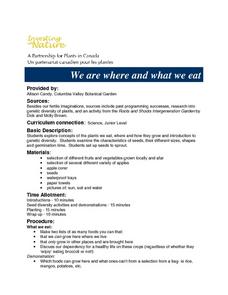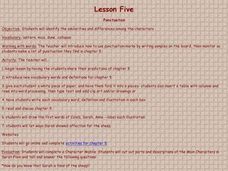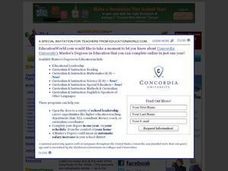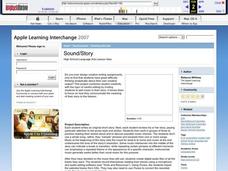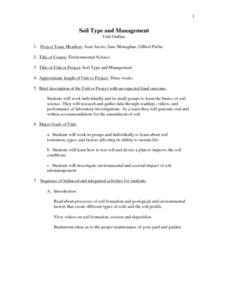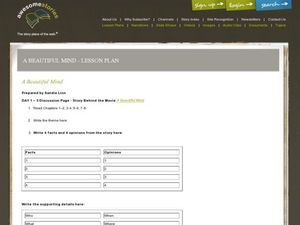Curated OER
Geology
Fourth graders devise a workable inch-to-inch scale for a geologic timeline sequencing the eras covered in the unit. They hypothesize from descriptions of dinosaur fossil evidence.
Curated OER
Oregon Cities
Students research one 20th century Oregon city, focusing on its population changes and the reasons for the changes. They write an expository essay which includes graphs/charts.
Curated OER
Interview a Professional: Professional Sports
High schoolers research a career featured on a career website. They email an expert in the field of their choice. They conduct a questionnaire of the expert and record their findings. They collate their information and write a written...
Curated OER
We are where and what we eat
Students explore concepts of plants they eat, where and how they grow and are introduced to genetic diversity. They examine seed characteristics, look at their different sizes, shapes and germination time. They also set up seeds to...
Curated OER
Theatre- The Critic's Review
Learners construct a critical review of a performance. In this theatrical lesson, students learn why critical reviews are important and create their own critical review. Learners discuss their review.
Curated OER
Data Analysis and Probability: Graphing Candy with Excel
Collect and graph data using Microsoft Excel with your math class. They will make predictions about the number of each colored candy in a bag of M&M's, then sort, classify, count, and record the actual data before using Excel to...
Curated OER
Analyzing Literature via Literature Circles
Introduce literature circles with Roland Smith's novels. Your seventh graders will see the activity modeled as you read The Three Little Pigs together and apply the format to a Roland Smith novel of their choice. The lesson includes...
Curated OER
Scavenger Hunt
Fourth graders demonstrate the ability to locate, retrieve and handle media and equipment. They compose a written discourse to inform. They participate in a library media center scavenger hunt.
Curated OER
Sarah Plain and Tall- Lesson 5
Students read a chapter in a book. In this character comparison lesson, students predict what will happen in chapter 5 of Sarah Plain and Tall, learn new vocabulary words, read and discuss chapter 5 and draw the first words of three...
Curated OER
The Visible Spectroscopy Expert Witness Problem
In a simulated crime science investigation, chemistry or physics sleuths use spectroscopy to analyze solutions. The lesson gives learners practice making salicylate solutions, using spectrophotometers, calculating dilution amounts,...
Curated OER
Gold Rush California and its Diverse Population
Students compare contemporary cultural differences with historical differences based on population percentage. In this cross-curriculum Gold Rush/math lesson plan, students analyze aspects of California's Gold Rush population and...
Federal Reserve Bank
Unintended Consequences
What would your class members say to the opportunity to take two years off of school between grades 10 and 11? Examine the economic concepts of costs, benefits, and unintended consequences with this unique and engaging approach.
Curated OER
Sound/Story
Students combine creativity with the rigor of careful editing by adding music to their story. It forces them to focus on how they communicate the meaning of their story to the listener.
Curated OER
Soil Type and Management
Students study the basics of soil science. They research and gather data through readings, videos, and performance of laboratory investigations. As a team they generate oral and written recommendations for the amendment of soil.
Virginia Department of Education
Analyzing and Interpreting Statistics
Use measures of variance to compare and analyze data sets. Pupils match histograms of data sets to their respective statistical measures. They then use calculated statistics to further analyze groups of data and use the results to make...
Curated OER
Family Pictures (Cuadros de Familia)
Designed to be spread across multiple days, this mini-unit gives learners an opportunity to develop family related vocabulary. Start by reading selected pages from "Family Pictures-Cuadros de familia" by Carmen Lomas Garza, and then...
Inside Mathematics
Marble Game
Pupils determine the theoretical probability of winning a game of marbles. Individuals compare the theoretical probability to experimental probability for the same game. They continue on to compare two different probability games.
Tech4Learning
Fantastic Fractions
Learners study how shapes can be divided into equal parts, that each part be equal to its counterpart, and combining parts equals one whole. They make the shapes out of modeling clay and take digital pictures of its parts to create an...
Curated OER
A Beautiful Mind: Main ideas and supporting details
This activity that accompanies a reading of A Beautiful Mind includes over 20 questions that address theme, fact and opinion, supporting details, characterization, and quote comprehension.
Curated OER
Language: Has the Cat Got Your Tongue?
Use funny tongue twisters to entice your young learners! They'll love this game where they face off against members of the other team and recite tongue twisters. Who will win this enunciation and pronunciation competition!
Curated OER
American Flag History
Young historians explore US culture by investigating the US flag. They will use their textbooks, prior knowledge, and sources provided by the teacher to research the history of the American flag. They will design and create a trading...
Curated OER
Role Models
First graders identify heroes by researching their family history. In this personal heritage lesson, 1st graders define the term "hero" and the characteristics that represent it. Students research family resources and family trees in...
Premier Literacy
Point of View
Incorporate technology into a literature activity with an innovative language arts activity. Middle schoolers read an electronic version of original stories or fairy tales, and after determining the point of view, rewrite the tale from a...
Curated OER
Beginning Daily Activities Unit
Begin each day with a warm-up that has ELLs focusing their minds on a skill that will be taught that day. Focusing on verbs, each daily lesson reinforces study and self-management skills, helps learners become proficient in working with...





